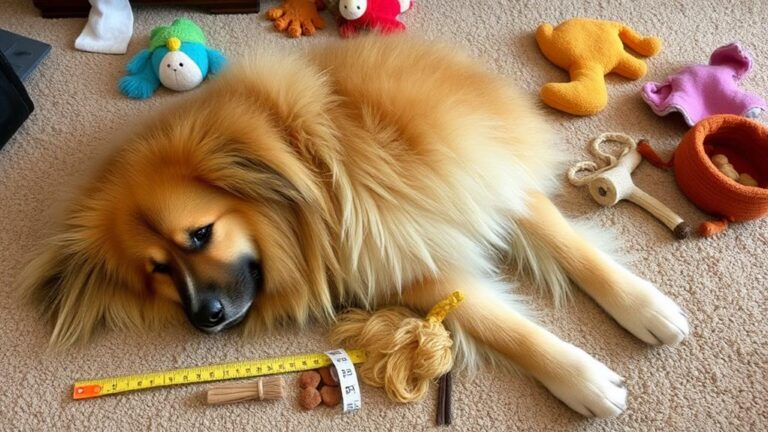Your dog's gas might smell like rotten eggs because of hydrogen sulfide gas produced during food breakdown in their intestines. Certain foods, like beans and dairy, can cause this gas. If your dog eats hard-to-digest foods or spoiled items, it may lead to foul-smelling gas too. Some dog breeds are more prone to gas problems, so keep an eye on their diet. You can reduce their gas by avoiding table scraps and using high-quality dog food. If you notice any unusual symptoms, like vomiting or diarrhea, it's wise to consult a vet for more advice and guidance.
Causes of Foul Smelling Gas
Flatulence in dogs can be a real nose-wrinkler, and understanding its causes is essential. One main culprit is the bacteria in your dog's intestines. These bacteria break down food and release hydrogen sulfide gas, which smells terrible.
Additionally, certain foods, such as onions, can pose serious health risks to dogs and lead to gastrointestinal issues; even small amounts can be harmful due to onion toxicity risks. Foods like beans or dairy create more gas in the colon.
If your dog eats something hard to digest, it can lead to excessive fermentation. This means gas builds up and has to come out as flatulence. Also, if your dog sneaks a bite of spoiled food, that can cause sudden gas too.
Keeping an eye on your dog's diet helps you figure out what's causing their stinky gas and can lead to a happier, less gassy pup!
Management of Dog's Gas
Managing your dog's gas can greatly improve the overall quality of life for both you and your furry friend. Start by making some simple changes to your dog's diet and habits: consider the potential effects of chicken bones when evaluating your dog's dietary needs, as certain human foods can lead to digestive issues.
Avoid giving table scraps to lessen gas production. Eliminate dairy products, which can be tough on your dog's stomach. Prevent access to trash, keeping your dog safe and minimizing gas triggers. Identify and avoid specific gas-inducing foods, like beans or cruciferous veggies.
You can also try slower feeding techniques if your dog tends to gulp food. These changes may help reduce gas and prevent foul smells.
Dog Breeds Prone to Gas
Some dog breeds are more prone to gas and flatulence due to their unique digestive systems and eating habits.
For example, Boxers are known for their frequent flatulence. You might notice that Doberman Pinschers also experience gas issues often. Golden Retrievers can be gassy, too.
If you have a Pug or a Pit Bull, you'll likely deal with gas problems as well. Beagles and Yorkshire Terriers frequently let wind, so you'll want to keep an eye on their diet.
Each of these breeds has specific characteristics that can lead to increased gas production. Understanding your dog's breed can help you manage their flatulence better and create a more comfortable living environment for both of you.
Dietary Solutions for Gassy Dogs
Finding effective dietary solutions is essential for owners of gassy dogs looking to alleviate unpleasant odors and improve their pets' comfort.
Consider these top dog food options that can help reduce gas:
- Taste of the Wild High Prairie Grain-Free
- CANIDAE Grain-Free PURE Salmon & Sweet Potato
- Purina Pro Plan Focus Sensitive Skin & Stomach
- Hill's Science Diet Adult Sensitive Stomach
These foods are formulated with easily digestible ingredients. They can help minimize gas buildup and improve digestion.
Always remember to introduce new foods gradually to prevent stomach upset. Keeping a consistent diet will also help identify any specific ingredients that might cause gas.
Your dog will feel better, and so will you!
Remedies and Dietary Adjustments
While dietary solutions can considerably reduce gas in dogs, there are also effective remedies and adjustments you can implement to further alleviate any discomfort your pet may experience.
Using simethicone, like Gas-X, can help relieve gas but consult your vet first. For gentle digestion, feed your dog chicken and rice. Shredded chicken can also help stimulate their appetite.
Adding pumpkin to your dog's meals is beneficial for their digestive health. Additionally, homemade bone broth can soothe an upset stomach.
Baby food, without added ingredients, is another great option to calm digestive issues. Making these adjustments can greatly improve your dog's comfort and reduce the unpleasant odor of their gas.
When to See a Veterinarian
If your dog's gas is accompanied by any concerning symptoms, it's essential to consult your veterinarian without delay.
Look for these signs:
- Vomiting: This can indicate a more serious issue.
- Diarrhea: Frequent loose stools may signal digestive trouble.
- Lack of appetite: If your dog refuses food, it's a red flag.
- Abdominal pain: Signs like whining, restlessness, or a tense belly need attention.
These symptoms can suggest underlying health problems that could require immediate care.
Don't hesitate to reach out to your vet if you notice anything unusual.
It's always better to be safe than sorry when it comes to your furry friend's health.
Monitoring their gas can help keep your pup happy and healthy!
Conclusion
To sum up, bad-smelling gas in dogs, like rotten eggs, usually comes from their diet and digestion. You can help your furry friend by understanding which foods cause gas and making some simple diet adjustments. Keep an eye on breeds that are more prone to gas issues. If the smell doesn't improve or your dog seems uncomfortable, it's best to visit the vet. A happy pup is worth the effort, and you'll enjoy fresher air at home!



